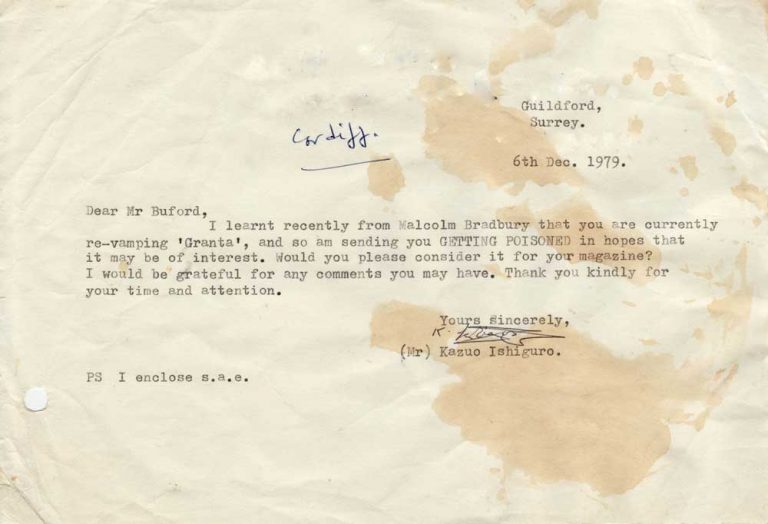This week, British author Kazuo Ishiguro was awarded the Nobel Prize in Literature and celebrated by the academy as an author, ‘who, in novels of great emotional force, has uncovered the abyss beneath our illusory sense of connection with the world’. We’ve been looking back at our long relationship with Ishiguro, which began back in 1983 when then-editor, Bill Buford, struck by an intriguing submission embarked on ‘a series of phone calls – to Norwich, London, Guildford – until finally I reached an unknown Kazuo Ishiguro in a bed-sit in Cardiff; the pay-phone was in the hall.’ You can find several of his earliest stories, and even a short play from 1993, in the Granta archive.

To toast Kazuo Ishiguro’s success, we present his work alongside the writing of fellow laureates, all published at some point in their careers by Granta:
2015 / Svetlana Alexievich ‘for her polyphonic writings, a monument to suffering and courage in our time’
Alexievich’s ‘Boys in Zinc’ is a masterpiece of reportage. Originally published in 1990, it presents an unflinching, harrowing vision of Soviet-Afghan war from the perspectives of those witnessing the suffering.
2013 / Alice Munro ‘master of the contemporary short story’
‘In Sight of the Lake’ is a short story from the ‘master of the contemporary short story’ – need we say more?
2012 / Mo Yan ‘who with hallucinatory realism merges folk tales, history and the contemporary’
The 109th recipient of the award, Mo Yan was the first ever resident of China to receive the the Nobel Prize in Literature. In this story, a reluctant abortionist is overwhelmed by a tide of aggressive tropical frogs.
2010 / Mario Vargas Llosa ‘for his cartography of structures of power and his trenchant images of the individual’s resistance, revolt, and defeat’
In ‘Cheap Intellectuals’, Vargas Llosa reports from a Danish literary festival, excoriating the organisers for their intellectual condescension towards Latin American literature.
2009 / Herta Müller ‘who, with the concentration of poetry and the frankness of prose, depicts the landscape of the dispossessed’
Herta Müller presents a derelict factory town seen through the eyes of a young girl in ‘The Way of the Apple Worm’: ‘The mother of the needle is the place that bleeds. The mother of the needle is the oldest needle in the world, the one that gave birth to all needles.’
2007 / Doris Lesssing ‘that epicist of the female experience, who with scepticism, fire and visionary power has subjected a divided civilisation to scrutiny’
In a short, intimate essay for Granta, Lessing describes the view from her bedroom. Even in this brief passage, Lessing shows off her eye for the uncanny: ‘the Victorians put their water under lids of earth’, she observes, describing a nearby reservoir.
2005 / Harold Pinter ‘who in his plays uncovers the precipice under everyday prattle and forces entry into oppression’s closed rooms’
In ‘Girls’, a short work of prose, the narrator muses lecherously on the phrase, ‘Girls like to be spanked’. Is this a true story or a work of fiction? We’re left uncertain.
2003 / JM Coetzee ‘who in innumerable guises portrays the surprising involvement of the outsider’
‘Youth’ is an extract from Coetzee’s semi-autobiographical novel of the same name, published a year before his Nobel win. The story recounts his struggles in 1960s London after emigrating from an unstable South Africa.
1992 / Nadine Gordimer ‘who through her magnificent epic writing has – in the words of Alfred Nobel – been of very great benefit to humanity’
Like much of Gordimer’s work, ‘What Were You Dreaming’ is a disconcerting portrait of apartheid South Africa. In this story, a black hitchhiker is shocked to be offered a lift by a young, progressive white couple.
1982 / Gabriel Garcia Marquez ‘for his novels and short stories, in which the fantastic and the realistic are combined in a richly composed world of imagination, reflecting a continent’s life and conflicts’
One year after receiving his Nobel Prize, Garcia Marquez responds to the Swedish Academy of Letters. He explains that the ‘richly composed world of imagination’ associated with Latin American literature is a response to the ‘monstrous reality’ of dictators, coups and wars on the suffering continent.







